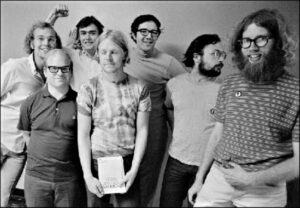
From left to right: Don Olson, Frank Kroncke standing behind Chuck Turchick, Bill Tilton, Pete Simmons and Brad Beneke. Not pictured: Mike Therriault. Cliff Ulen, the eighth plotter, participated in the planning but turned informant to the FBI and testified against the others at their trials. (Photo/Warren Hanson)
BY ED FELIEN
Summer is the time for reunions: for families, for high school and college graduates, and for prisoners released from prison for criminal political acts.
Fifty years ago, the Minnesota Eight were released from prison for attempting to break into Selective Service offices and destroy draft card files to protest the war in Vietnam. They celebrated their semicentennial release on July 8 at the Caspian Bistro.
From mnopedia: https://www.mnopedia.org/group/minnesota-eight:
“Around midnight on July 10, 1970, four teams of two or three people each broke into Selective Service offices in Little Falls, Alexandria, Winona, and Wabasha, intending to destroy as many military draft files as possible—acts of protest against the war in Vietnam. They mostly failed. Eight of them were arrested and charged with federal crimes. They became known as the Minnesota Eight.
“Chuck Turchick, Bill Tilton, and Cliff Ulen went to Alexandria; Don Olson, Peter Simmons, and Brad Beneke went to Winona; and Francis Kroncke and Michael Therriault went to Little Falls. Another team headed for Wabasha, while a fifth cancelled its action.
“Around midnight the raiders all broke into the Selective Service offices, prepared to destroy files. They concentrated on those of citizens designated 1-A—that is, subject to call-up at any time. In Alexandria, Little Falls, and Winona, FBI agents were waiting. The men, soon known as the Minnesota Eight, were arrested without incident.

Front row: Chuck Turchick, Mike Therriault, Brad Beneke and Don Olson. Back row: Pete Simmons, Bill Tilton and Frank Kroncke.
Photo by Cheryl Walsh Bellville first appeared as a centerfold poster in Hundred Flowers in 1970.
“The men were charged with the federal crime of interference with the Selective Service. They and their lawyers made the trials, like the raids, political acts aimed at informing and persuading the public of the evils of the war in Vietnam.
“There were three trials: two before Judge Edward Devitt, the third before Philip Neville. Rancor broke out before the first trial even began. At Brian Wells’s trial, Brad Beneke called Devitt ‘a pompous ass.’ Devitt sent him to jail for ten days. At his arraignment, Turchick said he could not expect mercy from a court that ‘jails people because they refuse to kill.’ At the first two trials (Turchick and Tilton, then Olson, Simmons, and Beneke), Devitt positioned armed sentries in the courthouse and kept many defense supporters out of his courtroom. Some supporters refused to stand for the judge and were ejected. A bomb threat and then a jury-misconduct mistrial marred the second trial. All five defendants were quickly convicted.
“The third trial, before Judge Neville, was completely different. He kept an open courtroom, used no armed guards, and allowed the defense to bring witness after witness to condemn the war in Vietnam. But in the end Neville ordered the jury to disregard all such evidence; Therriault and Kroncke were also quickly convicted.
“Rancor resurfaced at sentencing. Tilton called Judge Devitt ‘a good German’ who was ‘helping fascism come into this country.’ Devitt told the defendants that they were worse than ordinary criminals because their conduct struck ‘at the very foundation of government.’ Five of the seven got the maximum sentence of five years in federal prison; the two youngest, Beneke and Simmons, received indeterminate terms. All of their appeals were denied. They served between 14 and 20 months, mostly in medium security prisons, and were released in July 1973.”
It could be argued that the many protests against the Vietnam War by draft-age young men eventually persuaded the federal government to abandon the draft and go to a full-time professional army to support unpopular wars. This seems to conflict with the U.S. Constitution which says: “As standing armies in time of peace are dangerous to liberty, and have often been the means of overturning the best constitutions of government, no standing army, or troops of any description whatsoever, shall be raised or kept up by the legislature.” – Article 1, Section 8, Clause 12: Brutus, no. 10
“[The Congress shall have Power . . . ] To raise and support Armies, but no Appropriation of Money to that Use shall be for a longer Term than two Years.” – Article I, Section 8, Clause 12.























I found this site trying to find out whether Ed & Carol had been harmed by the Maui events of last week, but am delighted to find photos of some of my old pals.